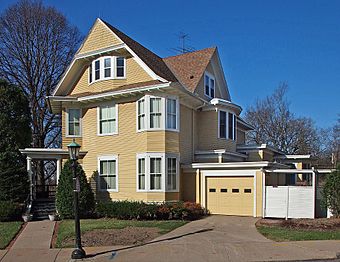27 Crocus Place facts for kids
Quick facts for kids |
|
|
27 Crocus Place
|
|
|
U.S. Historic district
Contributing property |
|

The historic house in 2015
|
|
| Location | 27 Crocus Place Saint Paul, Minnesota |
|---|---|
| Built | 1902 |
| Architect | John Magnus Carlson |
| Architectural style | Queen Anne revival |
| Part of | Historic Hill District (ID76001067) |
The house at 27 Crocus Place, also known as the J.M. Carlson House, was a beautiful old home built in 1902 in Saint Paul, Minnesota. It was designed in the Queen Anne style, which means it had a unique, fancy look. This house was an important part of the Historic Hill District, a special area known for its historic buildings.
A Home for a Governor
This historic house was once the home of Joseph A. A. Burnquist. He was a very important person in Minnesota, serving as the state's Governor from 1915 to 1921. A governor is like the chief leader of a state. While living at 27 Crocus Place, Governor Burnquist wrote parts of his famous book series called "Minnesota and its People" during the 1920s. This book helped people learn a lot about Minnesota's history and its citizens.
Why Was the House Special?
The 27 Crocus Place house was considered a "contributing property" to the Historic Hill District. This means it added to the historical importance and special character of the neighborhood. The house showed off the popular Queen Anne style of architecture from the early 1900s. This style often includes towers, turrets, and decorative details, making the houses look grand and unique.
The House's Final Years
Despite its history and the efforts of people who wanted to save it, the house at 27 Crocus Place was torn down in 2015. The city of Saint Paul and many neighbors worked hard to protect the building because of its historical value. They believed it was important to keep old buildings that tell a story about the past.
However, the final owners of the house, Fred and Renee Pritzker, wanted to build a new home. They planned to build a new residence for their adult son. A court eventually allowed the demolition to happen. As part of an agreement with the city, the owners had to carefully record and document the historic house before it was destroyed. This way, information about its design and history would not be lost forever.
 | Lonnie Johnson |
 | Granville Woods |
 | Lewis Howard Latimer |
 | James West |



